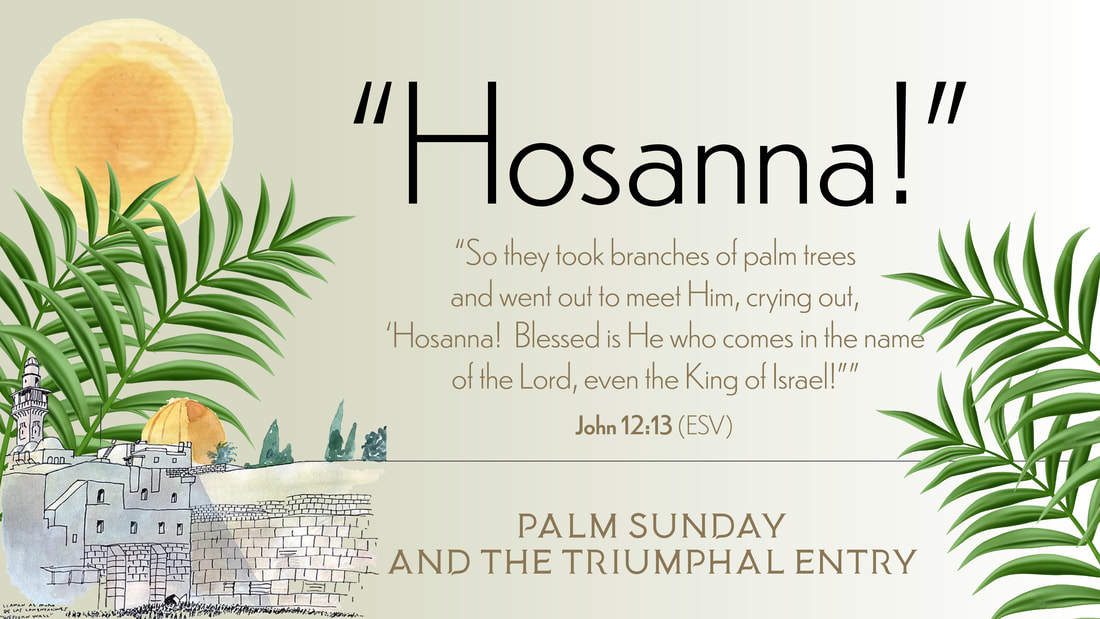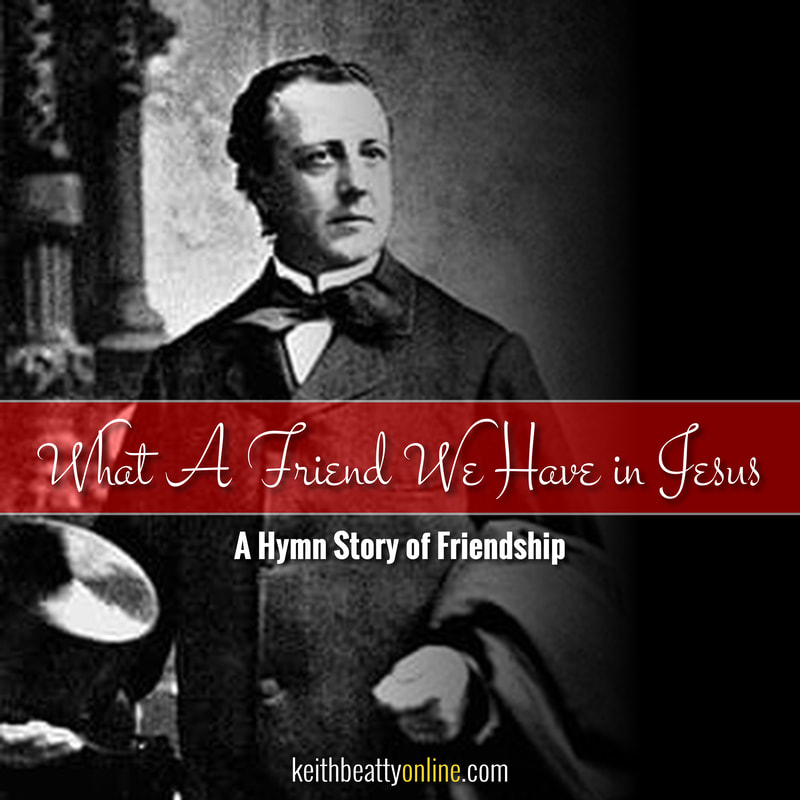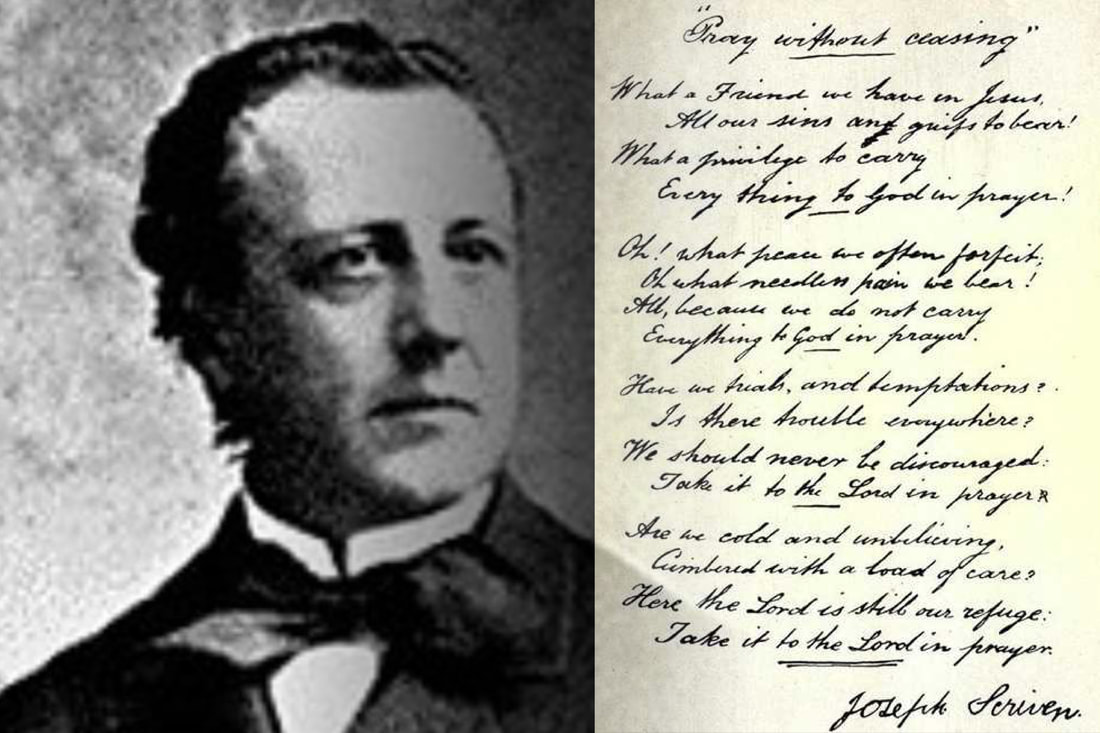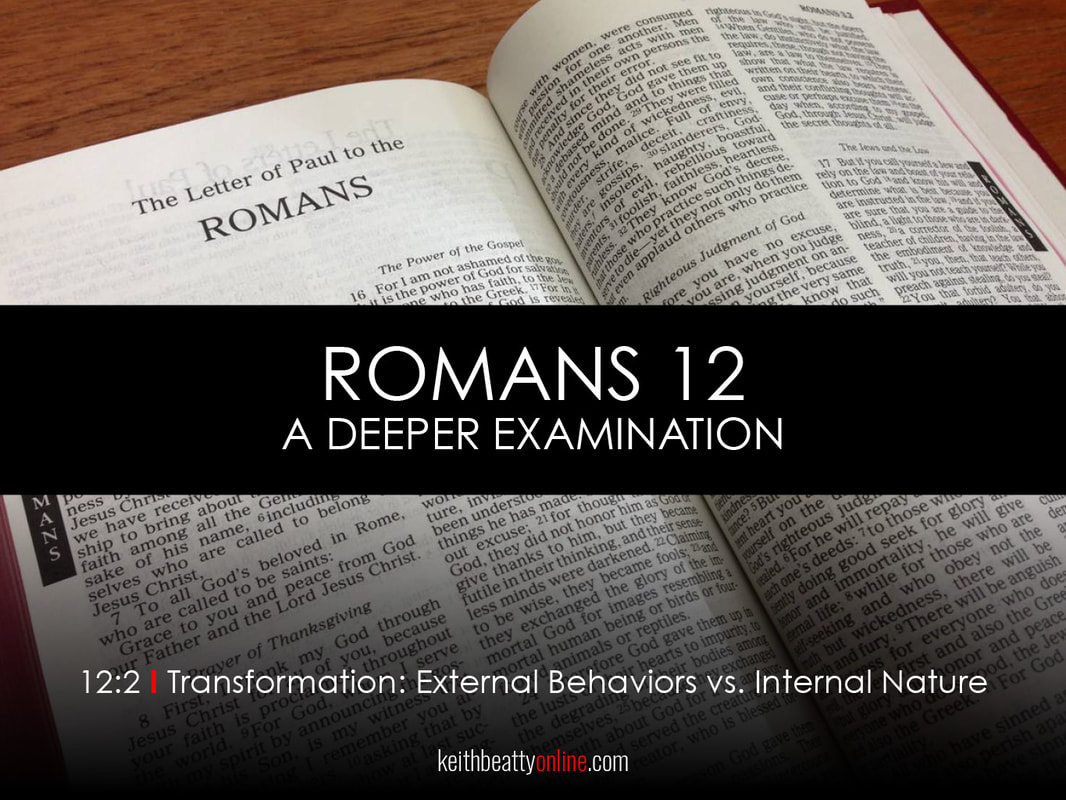|
Palm Sunday! I can't be with my wonderful church family today because I'm healing from surgery. It's probably the first Palm Sunday in 20+ years that I haven't been behind a piano leading worship. It's hurting my heart, but I know it must be this way. Anyway, I'm celebrating with them at home. I even stole a graphic I created for their powerpoint to use here. I love my church, and I love the God of that church! Today Jesus entered Jerusalem knowing full well what was coming, yet He chose to go anyway. And as he entered the city, the people cried out "Hosanna!" But what does the word Hosanna mean? The Old Testament was originally written in Hebrew and the New Testament was originally written in Greek. I’ll skip a bunch of information about translation and simply say it this way: The word we use for Hosanna (in English) is taken from a Greek translation of a Hebrew phrase, “hoshiya na.” This phrase is only found in one location in the Old Testament--Psalm 118:25. In that phrase it is the cry for help of “Save, please!” Years passed by, and for reasons that I won’t discuss in this post, the phrase “hoshiya na” stopped being an impassioned cry for help and transformed into an impassioned shout of hope and exultation for the Jews. What used to mean “Save, please!” gradually turned into “Salvation! Salvation! Salvation has come!” John Piper said, “The word moved from pleas to praise; from cry to confidence.” I would add that it went from a cry for help to a cry of happiness." In John 12:12, Scripture tells us, “So they took branches of palm trees and went out to meet him, crying out, “Hosanna! Blessed is he who comes in the name of the Lord, even the King of Israel!” I personally believe that these excited Jews were screaming out a cry of confidence and praise that Jesus had come and His entrance into the city was going to bring about victory. There’s so much to discuss in this passage, because some misunderstood his mission and thought that it would be to overcome Rome and free Israel. But, regardless, I assure you that Jesus entered Jerusalem to victoriously win a war. He came on a journey to face death by crucifixion and rise from a grave that could not hold Him. Christ is our victory, and hearts cry when trouble comes should be to Jesus—“Hosanna! Hosanna! Regardless of the circumstances, I know that Christ has come and brought in Him my salvation!” So, know that “Hosanna” is a cry of victory. It’s a cry of assurance, and it’s a cry that can only be made to a Christ who has defeat our sin, and He has defeated death itself. He’s alive today, and He’s already won the victory! What a glorious Savior we have!
1 Comment
This blog post is taken from one of my Facebook posts on this day last year. My precious father would live only 25 more days. The world around me was cast into a time of dissension and unrest, driven by the evil of politics and those who would espouse the latest flavor of an eroding culture suffering from self-compromised character. One year later, I find myself in the same place, literally in the same room, but dad is gone. God's present though. He's always here. I can recall the many times that I would sit with my father in the early morning hours. I would listen to him breathe while I studied Scripture. Those moments were precious, and I'm thankful that I realized just how precious those memories would be in my future. I engrained those moments into my mind. God spoke to me during those times. I would often feel like it was just God, my dad and me in the room. I was right. I still find it important to get away to a quiet place and talk to Jesus. I would encourage you to do the same, and I would encourage you to do it often. My Facebook post is below. Some thoughts today about our personal time with God… The world is loud around us, and it’s getting louder—much, much louder. Our culture screams content into our minds daily. We’re fed a constant stream of news reports and social media threads that try desperately to convince us to ally within the confines of our own race, and our own political ideology, challenging us to take our seat at a table that others have preordained appropriate for us. We’re expected to shut-up, sit down and assume a role that we may not agree with and possibly don’t even really understand. We’ll follow like sheep, if we succumb to the rants of a culture that is more “woke” with self-indulgent insanity than it is with Godliness. Our emotional separation from the ridiculous direction that our entire world seems to be headed could never be more important than it is today. If we have any marginal degree of intelligence, or any fear of God, we simply cannot follow the journey our world is trying desperately to undertake, for that journey will devour us all. We have already ventured too far, for too long. Jesus separated Himself from the world, and He did so by spending time alone with God. Note, I am not referring to time in church. Again, it’s time alone. Before I irreversibly offend those with a thinly-veiled faith, shallow enough to not think about God beyond the confines of a worship service, let me say that church is important, because church is a command of God. So polish up your Bible, iron your church clothes, and get to church, but, know this—churches are packed full of sinful people, many who show little to no personal differentiation from the evil world around them. Don’t expect to always find Jesus at church. His own parents lost Him there, and if we’re not prepared to find Him in private places, we should never have an expectation of finding Him in the middle of a bunch of sinners. Luke 5:16 says, “But He would withdraw to desolate places and pray.” Jesus took moments to distance Himself from the world and from the crowds of people who were all vying for His time and attention. He left them to spend private and intimate time with God, the Father. He knew He needed it, and He knew He needed it often. Why would we ever assume that we could get by without spending some of our time in the same manner? When we forsake personal time with God, it’s a simple process for the world to infiltrate and saturate our mind. When our personal time with God is not the foundation of our life, we empower other forces to create and shape our worldview. It is then that politicians, news commentators, and even our own friends and family can tell us who we should and should not hate. It is then that we mentally begin to assimilate ourselves into a decaying culture that is openly rotting around us. It is then that our empty void of personal relationship with God can turn our hearts and minds into a sewer of activism for whatever brand of unholy garbage is trending on social media that particular day. We should be better, but being better is an impossibility when our time with God is negligible. If we won’t let God teach us, the world will. If we don't let God refine us, the world will define us. If we don't let God heal us, the world will destroy us. Withdraw from the world, my friends, and withdraw often. Find time to connect with God, for it is only Him who will show you things more beautiful than your mind can comprehend. Find personal time with a God who will show a million reasons to love your fellow man, serve your brother and live fearless in a world defined by the propagation and controlling power of great fear. God will show you real hope, defined not by political legislation, but by the sovereignty embodied in who He is. And, He will place compassion into your life, because you cannot spend real time alone with God and miss the compassion and mercy extended to us all—everyone, every race, every nation—by the blood of Christ. The most important part of our life is our time connecting with the God who gave us that very life. If we miss Him—if we neglect Him—then our life is defined by everything in the world that is not Him. Stop allowing the whims of the world define the narrative of your life and opinions. For your own sake, for the sake of your children, for the sake of your fellow man, for the sake of our world, and for the sake of the Gospel of Christ—separate yourself and get alone with a God who deserves to be heard on a personal level. Jesus knew this was important. This post came up on my Facebook memories today, and I thought I would share it here, one year later....
One month and four days from this post, my father would surrender his life on this earth for something much greater. I have wonderful friends who, even today, buried a precious mother. Loss is real, and the pain around the death of a loved one cuts much deeper than you can prepare for. But through it all, God brings peace. For those going through similar things, know that you are not alone. Others have traveled the same road, and more importantly, God walks that road with you. Be encouraged as you remember the good times with those you loved who have departed this world. Embrace those memories, and know that they will bring both sorrow and joy. God was good in giving us a season on this earth to share a common journey with precious parents or friends who have passed away. The greater truth is that eternity for the children of God will be far sweeter than the joys of this life, and we’ll share it together, reunited with those we love who knew Him. Death is only a pause in our relationship. God has defeated death. The pain of earthly separation will one day melt into perfect peace, as God will redeem, restore and perfect that which has been lost. I can’t wait... _______________________________________________________________________________________________________ My Facebook post from 03.23.2022 is below: Comforting messages from strangers, and an update on my father. I’ve received an abundance of positive communication regarding the posts documenting my father’s journey—it’s a journey that our entire family is undertaking, and I felt led to share it. Almost daily, God is showing me why He has led me to open up and share these very personal things. It’s hard for me to be transparent where pain is involved. Frankly, it’s hard for me to open up "to the public” about anything; I’m fiercely private by nature. I make absolutely no apologies for being that way, but my heart views this situation differently. It needs to be shared in the light of its brutality and beauty, because it contains both. My father is slowly embracing a departure from this life, and though the pain for me is great, I’ve learned that God is still good. Not only is He good, He can be trusted with our weak emotions and the fragility of our very moody faith. Others need to hear that message. They need to see and read about the struggle of one of His children to find footing in the midst of severe emotion. And, they need to understand that God often allows things in our life to fracture our faith. These things are purposed—purposed pain. But, He’s a God who will fill in those fractures with an abundance of love and grace, and just like a fractured bone, our faith will heal back stronger and more resilient. For me, in this situation, the path to that healing is like casually strolling though sheer torment. God knows the journey; Christ traveled through something much worse, so His understanding is greater than our circumstances. We have a Savior who can relate. Thank you for your many kind messages, and thank you for reaching out to me personally. Knowing that these posts have made some kind of difference is encouraging. For the individual who messaged me today, thank you for sharing about your own journey. It runs somewhat parallel to my own. I don’t know this person. I’ve never met them, but God is doing something similar in their own life, and He’s doing it using the same tools of trial and grief—a dying parent. He’s growing them through their sorrow, and He’s teaching them of the great power inherent in submitting to a simple trust in God’s will, regardless of the painful emotions that often swell and hide our recognition of the gentle traces of God’s finger in our life. God works globally in the lives of people, and so many of us are sharing a similar journey. It’s wonderful to connect with someone over 5 states away who informs you that God has comforted them using my own thoughts about my dad. Their words comforted me. God’s love circles around every situation to incorporate strangers into friends, mourning into gladness, and grief into hope—bringing people together to shine a bright lamp upon His never-ending grace and mercy for all of His children. There is nothing that God leads us through barren of worth. Whether it’s the birth of a baby or the death of an elderly parent, everything comes with an ingrained worth of wisdom that must be discovered and examined to be understood and appreciated. I continue to learn much from God through this situation. I’m learning more about myself, my family, my friendships, my faith and my God than I ever have before, and it’s refreshing. My father’s situation brings me great sadness, but His destination brings me great joy! The ground between the two is a place of refining for me, and I’m trying desperately to pay attention. Update on dad… Dad has had a good last couple of days. He’s talking a lot, and he’s certainly aware of everything going on around him. Pain is always an issue, but dad is exercising his right to be tough, as he takes very little pain medication. His legs are showing the wear of their war with the delicate pressure of pillows, and he has some wounds from that battle. We help him fight that war everyday. His caregivers, including his family, are attentive to his every need, and, given the circumstances, he’s doing pretty well. Cognitively, we often ride a rollercoaster. There are days that God allows a very clear mind, and there are days that don’t offer demonstrable clarity. There are days with stronger spoken clear speech, and there are days where speech is weak and limited. So, every single word on every single day is of utmost importance. Thank you again for your prayers, visits and messages. They are all important to me and my family. God continues to be overwhelmingly merciful to us all. Dad’s life continues to grace our own with a beauty that I will never be able to fully describe. One year ago, I posted the words in the blog post below to my Facebook page. My father was suffering the final effects of multiple strokes, and he would only linger on this earth for about 5 weeks from this posting. This morning (03.16.2023), less than 1 year later, I took my precious mother to her first chemotherapy treatment. Her prognosis is encouraging, but it's cancer, and it weighs heavily on the mind. Never underestimate life, because it can be menacing. When trouble comes, it can overwhelm you with a force that can stagger even the greatest of faith. It's so important to never lose sight of God's sovereignty over every situation, even the situations that stab violently at our heart. And, it's important to never lose sight of God's love. God loved my father, and He took him home. God loves my mother, and He's allowing her a new journey that promises some great difficulty along the way. However, there's opportunity in that journey to find new ways of trusting a God who knows the path that we must walk in order to enter into the beauty and perfection of His will. While we walk through our journey, whether the road is flat or steep, whether the situation is joyous or heartbreaking, understand that the time we have with those dear to our heart is precious. God has allowed every moment for specific purposes, and we should embrace every moment with a passion. Once those moments pass, they cannot be retrieved. Time is precious, my friends. Don't waste it. My Facebook post from 03.16.2022...
Anne L. de Stael once said that, "We understand death only after it has placed its hand on someone we love." I think that's true. My father continues to do fairly well, and he has made some cognitive improvements over the past couple of days. The journey continues to be almost overwhelmingly hard at times, but my parents built our family on a very solid foundation of faith and trust in God. My father's great efforts at the aforementioned are culminating now in my own life, and everything that he has ever taught me about having a faithful trusting of God's plan is bearing fruit. As God continues to gently guide my father home, He is also proving, time and time again, that our hope and trust in Him is not misplaced. God is also showing me more and more about the great worth of my relationship with my earthly father, the wisdom in his words, the lessons of his actions and the priceless gift to our family that he continues to be—if only for a little while longer. In over 20+ years of ministry, singing or playing at 100+ funerals, losing friends and family—through all of that, I don't think I've ever fully understood death. I don’t claim to completely understand it now, but I have a much deeper and more grounded understanding of it today, as God has brought it to our very doorstep. It's an unwanted visitor, but death will eventually demand entry into all of our lives. It's painful; it's horrific, and the process of watching a loved one die seems to drain every ounce of strength and emotion from your soul. It leaves you totally exposed, and, often, it will make you feel inconsolable. Watching death, when it finally arrives, requires an abundance of things you may find scarcely provisioned in your life. Be ready, although I find it hard to believe you can really be prepared. It’s harder than you might imagine. No sermon prepares you for dealing with the death of a loved one, because no pastor has that kind of gifting. God's Word speaks of death and comfort, but simply reading Scripture alone will not bring peace. To understand death, and have a peace regarding the same, one must simply wade into it, much like you tolerate walking into a cold ocean, holding tightly to the hand of Jesus, as He guides you through a process that you don’t desire, don’t understand and one that causes for you a tremendous amount of grief and pain. It's a pain that can't be "preached" or "read" out of you; it's a pain that must be experienced to be understood. Moreover, we will most likely never understand the journey, and the pain will never fully depart our consciousness. Any words to the contrary are simple foolishness. But then there’s God… As hard as this is proving to be, God continually shows up… God shows up in short conversations with my father, conversations composed of very few words but literally drenched in an abundance of love. He shows up in a brief smile from my dad, as we reminisce about times gone by. He shows up where no words are spoken at all, and there is only the force applied by the clinching of his aged hand in mine. He shows up when that same aged hand refuses to let go of mine. He shows up as I listen intently to my father’s breathing in times of peaceful sleep. God shows up when my mother prays. He shows up when my wife prays. God is there, in the ever-abiding presence of the Holy Spirit, who comforts those who were previously inconsolable. John 14:26 says, “But the Helper, the Holy Spirit, whom the Father will send in my name, he will teach you all things and bring to your remembrance all that I have said to you.” This verse reminds me that God, through the prompting of the Holy Spirit in my father’s own life, used my earthly father to teach me about faithfully trusting the God he loved. My dad prepared me for this very journey throughout his entire life, by pouring his own faith into me and living out that very example. And here, today, God, though the Holy Spirit, reminds me of His promises through the spoken words of my dad in years gone by. It’s as if the Spirit of God sits beside me whispering peace into my mind daily, reminding me of my earthly father’s words—reminding me that those are the very words and the very promises of God. The Holy Spirit does this, and it’s beautiful. An understanding of the death of a loved one cannot be taught. It can only be understood when Jesus, through the comforting of the Holy Spirit, stands beside you guiding you through it. I will tell you, it can be messy. Thankfully, God understands messy; He understands our grief and sorrow; He understands every pain; He allows grace for sleepless nights on a couch; He provides for us when mental exhaustion takes more than its fair share, and He is always beside us, through the presence of a Holy Spirit who never tires of holding the hand of a grieving son who, in many ways, already misses his dad. Pastor, evangelist and author, Alan Redpath, once said, “There is no circumstance, no trouble, no testing, that can ever touch me until, first of all, it has gone past God and past Christ, right through to me. If it has come that far, it has come with great purpose.” You know, life can deal us out a lot. More often than not the available space on our plate is already at a very sparse minimum, and we are already convinced of our inability to coordinate even one more small task. And then God allows more, and the allowance isn’t always tolerably small. The little phrase “but God…” is often used in the context of God sweeping in with abundant grace, mercy and provision to “fix” a bad situation. However, it may be less utilized in a sentence like this: “My plate was already full, my emotions were already tattered, my faith was already shaken, and I could not bear another load--but God unexpectedly added ______________.” It’s important to know that a loving God will absolutely test our tolerances. We like for God to rush in mightily with the supernatural help and resources needed to bring resolution and peace to formidable situations in our life, but we like it much less when God sweeps in and heaps unexpected challenges and difficulties into a life and schedule that may be, by our own evaluation, already pressed to the limit. As of late, my own plate has been pretty full. My father passed away in April of 2022. Shortly after that, my wife and I packed up our house, sold it and moved. Then, almost immediately, God moved me to a new church. All the while, I’ve been battling with a very painful pinched nerve which has brought a halt to many things in life that I enjoy. It's been a tight schedule of P.T., chiropractor visits and now I have a second MRI scheduled this week—one that I pray will lead directly to the corrective surgery needed in this situation. Between my own doctor appointments, we now add that my precious mother is awaiting some test results. We’ve been busy, but it’s not as much physical busyness as it is mental busyness, and for me, constant nerve pain. It’s been draining. It continues to be draining, but God continues to be good. Recently, I’ve found that Scripture brings a much greater worth of comfort to me than it has in past years. I believe there are two reason behind that fact. The first is that I’m hopefully growing in my walk with Christ. The second is that I’m older, and God has had more years to “put me through some stuff.” How comforting it is to know that all of that “stuff” has been vetted by God Himself. The minute details of every difficulty has been thoroughly examined, weighed and measured by a God who has then allowed into my life for purpose. Let’s quickly look to Scripture… Psalm 119:71-72 says, “It is good for me that I was afflicted, that I might learn your statutes. The law of your mouth is better to me than thousands of gold and silver pieces.” Eugene Peterson translates this wonderfully in the Message.” He says, “My troubles turned out all for my best. They forced me to learn from Your textbook. Truth from Your mouth means more to me than striking it rich in a gold mine.” There’s a richness in the lessons of “affliction” and difficulty that money (or a gold mine) can not purchase. Understanding the fact that God uses everything in our life to focus us on Him, we should be encouraged when difficulty comes to fill our plates. That's a tough feeling to embrace when walls begin to close in around you, but when that happens, we should immediately begin looking for God's purpose. God always has a purpose, and in that purpose, we always have an opportunity. Pastor Rick Warren once wrote something like this: "Life is series of problem-solving opportunities which will either develop you or defeat you, depending on your response to them." He then went on to list 5 ways that God wants to use difficulties in your life. From my best memory they are as follows: God wants to use problems to DIRECT you, INSPECT you, CORRECT you, PROTECT you and PERFECT you. I’m sure you can search online to find his resources, but the information that I have recalled brings some positive light to situations that may often seem just a little too much at the moment. Isn’t it good to know that God has already looked through every situation that He allows to transpire in our life? The journey that those difficulties must take as they travel through God’s meticulous vetting and then on to us, being strategically implanted into our life at just the correct moment, should clarify that they hold a place of great importance in God’s ultimate plan. Difficulties are opportunities to find God and learn from Him. Friends, be encouraged that God has good plans for you, and I pray that you understand the sovereign authority that God wields in allowing the difficulties that interrupt our schedule and possibly even steal our peace. Nothing enters our life without sovereign permission. Don’t neglect to find the beauty of God’s goodness, often coming to us initially disguised as struggle. That struggle has made a great and long journey, and it arrives with even greater purpose. Insecurity is painful, and insecurity can damage almost everything it touches. Unfortunately, it can be a common issue challenging many who walk among us, and thereby, it becomes an issue for those who don’t battle the personality trait themselves but must interact with those who do. However, let’s be sure to understand that we all most likely suffer from some form of insecurity, so don’t develop any high and mighty feelings of superiority over someone who is struggling. Insecurity in others has touched my life and the life of my family in more ways than I’m comfortable with in recent years. In some cases, I addressed it directly, and in other cases I didn’t address it at all, although I probably should have. However, some battle are just not worth fighting. For the sake of sanity, it’s often best to walk away. And, I did. But, those years have caused me to do some research on the subject of insecurity and the toxic traits that can often pour forth from the life and actions of an insecure person. Insecurity is characterized by feelings of inadequacy, low self-esteem and a diminished view of their self-worth, although everyone suffering from insecurity doesn’t display those feelings in ways that we might think. Read on. Jennifer Guttman, Psy. D., says: “...it’s estimated that roughly 85% of people worldwide (adults and adolescents) have low self-esteem. Low self-esteem has been linked to violent behavior, school dropout rates, teenage pregnancy, suicide, and low academic achievement. The World Health Organization (WHO) reports that more deaths are caused by suicide every year than homicide or war.” (Jennifer Guttman, Psy. D, “The Relationship With Yourself,” Psychology Today, June 27, 2019) Insecurity drives damaging and even dangerous behavior. Common personality traits of insecure people can be negative self-talk or self-depreciation, but insecurity can also manifest itself outwardly and into the lives of others. It can reveal itself in jealousy, approval-seeking behaviors, bragging, flamboyant narcissism, competitiveness, obnoxious bullying, a negative mindset toward seemingly everything they encounter that is “not their idea” and outright aggression towards others. Insecurity can often bring about unnecessary drama and toxicity into the lives of those who must engage with those suffering from this increasingly damaging personality trait. But, how do we deal with this? Should we deal with this? First off, we must call it out for what it really is—a problem, and in most situations, I would say that we should confront it. The confrontation is hard, because it will most likely not be well received, and discussing it in a way that promotes peace, love and understanding can be difficult. I’m not an expert at anything here, but my own research in both Christian-based and mainstream psychological studies has led me to the following conclusions: We Must Hear Them Out Let the insecure among us talk, regardless of the conversation; give them space to breathe; and let them air their narrative. Dismissing an insecure person could possibly make the situation worse and add to their own insecurities. No one responds well to being “dismissed” from the conversation. Instead, include them, but regardless of whether they venture into self-deprecation or extreme narcissism (or anything in between), the insecure elements should then be identified, examined and prayed over, and a decision should be made whether their actions are detrimental to themselves or others to a degree that they need to be addressed. If they do, then address them. Looking the other way may only serve to empower and escalate the same behavior. Wait For The Right Time The correct time to confront an insecure person may not be in the middle of a display of insecurity. If emotions are running high, then it would almost always be more fruitful to wait to address your concerns with them. I would say a private conversation, at least initially, is not only more productive but also a display of Christ-likeness. Private conversations may lead them to open up and reveal some of the more relevant issues that are causing them to display a behavior that is damaging to themselves or others around them. Addressing it publicly could be viewed as an attack and cause a bad situation to spin out of control. The goal is to help, to heal and to unify. If you’re going to address damaging behavior, be sure that you’re doing it at a moment when your own mind is calm, collected and seeking to understand and help. Understand the Process Understand that you’re not their savior, and your confrontation of the situation may not be the counseling they necessarily need to hear. You may not be the person God has called to counsel them through this difficulty and truly help them, but God has someone who can. Point them in a direction toward people who can help. Never have the expectation that calling out bad behavior will change it immediately. There’s a process involved that is probably greater than your intervention. Pray diligently that God would lead them to people who will genuinely understand, care and engage them with love and grace. In turn, you show love and grace while the process takes place. Create Healthy Boundaries Each of us needs to examine our definition of healthy boundaries, for our own happiness and personal mental health. On the more docile side of insecurity—if an insecure person constantly seeks validation from you, this can distract you from things in your life that are more important. Frankly, it can also lead you to develop a little of your own personal brand of narcissism, so be careful. On the more damaging side—if insecurity is leading someone to be personally aggressive towards you, or if they develop into a bully or narcissist, then you must examine how much of that behavior you intend to tolerate, based on your boundaries. There’s a saying that “What you allow is what will continue.” I believe this to be true in every sense of the word. Don’t allow the insecurity of others to take command of your mind, your life, or your organization. If healthy boundaries can exist, then they need to exist. Determine your boundaries, and clearly communicate your boundaries and tolerances. Know When to Cut Ties If you’re reading my blog, you probably identify yourself to be a Christian, and I hope you do know Jesus. Scripture tells us to have love and compassion for others, even our enemies. It’s hard for a follower of Christ to eliminate another person from their life, because we feel it violates our call to be Jesus to our world. However, the sad truth is that there are people among us who are toxic, and they simply don’t want to be any other way. When this is the case, there is a time to cut ties with them. Even God, in Romans 1:28, gave some over to a depraved mind—those who thought the knowledge of God was not worthwhile. Don’t pursue a relationship that is grounded in toxicity. You don’t have to. Pray for them, love them, but understand that there may come a time for you to move on. Luke 6:27-28 tells us, “…Love your enemies, do good to those who hate you, bless those who curse you, pray for those who abuse you.”
If all of the aforementioned fails to bring an understanding or change of behavior, then walk away. We can’t effectively fight every battle that rages inside of another person’s mind, even if their own battles spill over into our personal lives. And, do it all with a mindset of love, constantly looking for an opportunity to reconcile that relationship with the same grace that Christ has reconciled us unto God. Joseph Medlicott Scriven (1819-1886) was born in Seapatrick, Ireland and died in Ontario, Canada. He was a man of some wealth and he had the sincere heart of a servant. Joseph was a selfless person by nature, always looking for ways to serve others. He could often be seen walking through the streets of Lake Rice, Canada carrying a saw and sawhorse. Some would attempt to hire him to cut wood, but he would only offer his services for free, to those who could not afford the work. He was born on September 10, 1819, in Ireland to a family of who possessed the financial means to send him to Trinity College in Dublin. He attended classes there before joining the military, training for service in India. Because of poor health, he resigned his military ambitions and returned to Trinity College where he graduated with a bachelor’s degree in 1842. Early in life, Joseph Scriven fell in love. The relationship led to a marriage proposal, which was readily accepted. The preparations for the ceremony were made, and everything was ready. On the evening before the wedding, his fiancé was crossing a bridge over the River Bann. She fell from horse and accidentally drowned. Joseph was on the other side of the river and witnessed the accident; however, he could do nothing but helplessly observe the incident. Full of sorrow and grief, Joseph began to wander. Around the age of 25, he found himself in Woodstock, Canada West (Ontario). Around 1844, Joseph was tutoring students, preaching and working among the impoverished. He would often serve and refuse compensation for his efforts. He was a viewed as a valuable and cherished member of that community. In 1857, he relocated to Bewdley, where he met and fell in love with Elisa Catherine Roche. Their relationship deepened and a wedding was planned. Sadly, in 1860 Elisa died of pneumonia before they could be married. Joseph Scriven’s life was full of tragedy. He was familiar with both love and loss, but he had a relevant relationship with Jesus. At one point, Joseph become ill, and while visiting with him, one of his friends discovered a poem at his bedside. When the friend inquired who had written the poem, Joseph replied, “The Lord and I did it between us.” It was never Joseph’s intention for anyone to see the poem but his mother. He had written the poem out of the pain and grief of his past experiences, and he intended to send it to his mother, who still lived in Ireland, to comfort her in her own sorrows. It’s uncertain how “What A Friend We Have in Jesus” (Pray Without Ceasing) first became published. For many years it was printed with authorship unknown, or incorrectly attributed to Dr. Horatius Bonar. Regardless, it did become known and it became popular. Samuel Caswell (1861-1938) published an early manuscript version that was signed by Scriven. Of the hymn, Caswell stated that it was “beyond question the best-known piece of Canadian literature.” (Macpherson, “Scriven,” n.d.). Stanza 1 is an establishment of the fact that Jesus is our friend, and that He can and will bear our burdens. Stanza 2 asks two rhetorical questions. The are rhetorical because all of us, all of humankind, suffers from “trials and temptations” and become witness to “trouble.” The second stanza then answers the questions in the short refrain, “Take it to the Lord in prayer.” There’s also a third rhetorical question asking, “Can we find a friend so faithful…?” It’s an intimate friendship with the One who indeed “knows our every weakness.” The refrain returns to give the solution, “Take it to the Lord in prayer.” Stanza 3 simply reframes the premise of the song using different questions, “Are we weak and heavy laden, cumbered with a load of care?” And, “Do your friends despise, forsake you?” The answer to all the questions returns with the famous refrain, “Take it to the Lord in prayer.” The song ends with Jesus wrapping His arms around His friend—who is us. Hymnologist Fred Gealy found and additional stanza which was published in Hastings’ Songs of Pilgrimage: A Hymnal for the Churches of Christ (Boston, 1886; Second Ed. 1888) with a fourth stanza, which I will present below: Blessed Jesus, Thou hast promised Thou wilt all our burdens bear May we ever, Lord, be bringing All to Thee in earnest prayer Soon in glory, bright, unclouded There will be no need for prayer Rapture, praise, and endless worship Shall be our sweet portion there Jospeh Scriven died in October of 1886. The Dictionary of Canadian Biography describes all that we know about the circumstances of his death: His last days were clouded with ill-health and despondency. James Sackville, his friend and fellow-believer, found Scriven ill and brought him to his house. One hot night in 1886, Scriven left his bed without disturbing anyone, probably to drink at a nearby spring: some hours later, presumably having fainted or fallen, he was found dead in the spillway of Sackville's grist-mill, a few feet from the spring. He was buried in the Pengelly burial-ground in an unmarked grave between Eliza Roach and Commander Pengelly. (Macpherson, “Scriven,” n.d.). Only a few days before Scriven’s death, Sackville encountered Scriven thoroughly dejected. At this meeting, Scriven told his friend that, “I wish the Lord would take me home.” (Cleland, 1895, p.17) It was never fully determined if Scriven’s death was natural, accidental or a suicide. Jesus was a friend to Joseph Scriven, and it was obvious that through a lifetime of service to God, Scriven experienced some deep tragedy. If the closing thoughts of his life are recorded correctly by Scriven’s friend, then Jesus did indeed come and take him home. Like many other disciples of Christ who have gone on before us, including my own father only a few months ago, Scriven now understands more deeply about the friendship of Jesus and the magnificent “Precious Savior” who is “our refuge.” And, as the mostly unpublished fourth stanza puts forth, they are all involved in “praise and endless worship,” which is “out sweet portion there.” Sources: Jay Macpherson, “Scriven, Joseph Medlicott,” Dictionary of Canadian Biography (Vol XI (1881–1890) James Cleland, What a Friend We Have in Jesus and Other Poems by Joseph Scriven with a Sketch of the Author (Port Hope: W. Williamson, Publishers, 1895) Philippians 4:7 says, “And the peace of God, which surpasses all understanding, will guard your hearts and your minds in Jesus Christ.” Almost 150 years ago, the words of that verse took on a new meaning for one man. On November 21, 1873, the French ocean liner, Ville du Havre, collided with the Scottish ship, Loch Earn, while both were crossing the Atlantic. Among the 313 souls on board the Ville du Havre was the wife and children of Horatio G. Spafford, a successful attorney from Chicago. Mr. Spafford, his wife and four daughters had planned a trip to Europe. His wife, Anna, and their four daughters boarded the Ville du Havre, but business matters held Horatio Spafford in Chicago. His plans were to join them in Europe a few days later. Four days into the crossing the ships collided. About 12 minutes after the collision, the Ville du Havre sank into the cold waters of the Atlantic, carrying with it 226 of the 313 souls aboard her. Among those were Mr. Spafford’s wife, Anna, and their four young daughters, Annie, Margaret Lee, Bessie and Tanetta. Some time later, a sailor in a rowboat navigated his small vessel over the spot where the large ship went down. He spotted a woman desperately clinging to floating debris from the collision. That woman was Horatio Spafford’s wife, Anna. She was pulled into the smaller boat alive, and around nine days later, she was eventually delivered safely to Cardiff, Wales. She wired her husband a message which began, “Saved alone, what shall I do?” Among some of the survivors was a clergyman whom we know as Pastor Weiss. He later recalled Anna Spafford saying, “God gave me four daughters. Now they have been taken from me. Someday I will understand.” Mr. Spafford quickly booked passage to join his grieving wife. Almost a week into the passage, the captain of his ship called for Mr. Spafford to join him in his office where he informed him that they were currently over the location where his children went down. According to Bertha Spafford Lester, a daughter born after the tragedy, Horatio Spafford penned the powerful and poignant lyrics to “It Is Well With My Soul” while on this journey. When peace like a river attendeth my way When sorrows like sea billows roll Whatever my lot, Thou hast taught me to say It is well, it is well with my soul It is well with my soul It is well, it is well with my soul Horatio Spafford’s life was spent among horrific grief and loss. Before the tragedy at sea, Horatio Spafford lost a young son to pneumonia. The year was 1871. In that same year, the great Chicago fire would destroy the majority of his business. Only two short years later in 1873, he would lose his four daughters to the tragedy at sea. And in the years following, he would lose a sixth child to pneumonia. In August of 1881, the Spaffords moved to Jerusalem. He lived the rest of his life in that city, and he is buried there today. Life can be hard. Tragedy and death will touch us all at some point, and the man-made fortresses that we erect out of our own strength will simply crumble and fall amidst the weight of pain and grief that only God can heal. For those who know Christ, He is the only Comforter. It is Christ and Christ alone who can inspire a man who has experienced such great loss to pen the lyrics of a hymn, lyrics claiming peace, while floating above the very location where the ocean consumed his four young daughters. I love hymns, and I love the stories behind them, for they are often powerful. Those stories give us insight into the minds and hearts of God’s people—people who are often molded into the image of Christ through great sorrow. We can find tremendous hope in the lyrics and songs they have left behind, for they are poetic evidence of God’s hand at work. That same hand is at work today. I’m thankful for Horatio G. Spafford. His faith and trust were tested in ways that many of us will never experience, yet His love and trust in God enabled him to find peace in the very waters that brought him such a great sorrow. “…Naked I came from my mother’s womb, and naked shall I return. The Lord gave, and the Lord has taken away; blessed be the name of the Lord.” — Job 1:21 Jesus Christ. He is without equal. He is the pearl of all of Heaven, and His glory is made manifest in all of His creation. His name and title we are unworthy to even speak, yet this same magnificent Christ lovely kneels low to hear what can often be inaudible utterances of pain and grief in the life of His children—children who are often devoid of real joy. Elisabeth Elliot has it right. “The secret of joy is Christ in me—not me in a different set of circumstances.” As I studied Hebrews today, this thought occurred to me: Our definition of the joy of Christ is often horribly skewed. Horribly. Horribly skewed. When things are going well, Christ is viewed as good and joy is easy. It’s almost cheap. When life and circumstances take a darker turn, we fail to experience the same cheap and easy joy we thought we possessed previously. In those moments, joy becomes much more expensive, because the true currency of real joy is intimate relationship with Christ. When we “lose our joy” in bad circumstances, the truth may be that we never possessed it to begin with. Real Joy Real joy, the joy of the Lord, is not exclusive to only good times; real joy is all inclusive through good times and bad. There's moments that it can be harder to find, but the joy of the Lord is grounded in our recognition and relevant relationship with Jesus Christ, who is the Truth. Real joy cannot be culled or squeezed out of emotion, because human emotion is often the enemy of real truth.
For too many years I’ve seen church services and messages that try desperately to cater to the whimsy of human emotion, and the aforementioned can easily generate an emotional response in the moment. It can catalyze a situational joy, but sadly, that situational joy can be quickly fleeting when the individual is thrust out of church sheltered and planned environment of a church service and back into a world full of very real and ever perplexing evils. People can flood the altar, they can dance, scream and shout, and they can shed tears in response to the triggering of their emotions in the circumstance of a worship service, and then they can walk out of the front doors completely unchanged, still living a life without real joy—living a life where Christ is magnificent at church but almost undetectable elsewhere. They may be living a lie. My point? We can’t place the foundation of our joy on the pedestal of a church service or a pastor’s message. If we can’t carry that same joy past the front door, through the gossipers and hypocrisy that can often be encountered on our way out of the church building directly following a service, then it may not be genuine. If we don’t carry that joy into the parking lot, on our trip home and out into a world where pain and grief exist in great quantity, then we don’t possess the real joy of the Lord. If the circumstances that invoke joy only revolve around a church service or an impassioned message, then we don’t possess the real joy of the Lord; instead, we are only experiencing a flood of deceptive human emotions that lead to no lasting change or joy when times become hard and the currency of real joy becomes tested beyond the boundaries of the church altar. I’ve watched this very thing occur frequently for over 20 years—incredible church services, inspiring music and moving messages that often seem to generate more momentary emotion than they do relevant change—change leading to more intimacy with Christ, which, in turn, produces foundational joy in the tough times. My friends, don’t pray for easier circumstances; pray for more Jesus. Don’t let Satan convince you that your alligator tears shed at the church altar on Sunday are sufficient to buy you joy through the succeeding six days, days which can be filled with bad behavior, faithless living and good feelings about a life unchanged by the Gospel while outside of the conditioned-air of a church sanctuary. Jesus is looking for you, right now... He’s seeking you out for a conversation regarding who inhabits the throne of your life. He’s offering to you more than eternal security from hell; He’s offering you grace and mercy for struggles and pain, a grace and mercy that embody the only place where real joy resides. If the secret of your joy is a church service once a week, then your joy is not grounded in Christ, my friend, and it’s not real joy. Churches are easy to find, a real, relevant, life-altering walk with the Lord can only be found by digging deeper than momentary religious activity. Real joy is relational; it is not situational. God's grace and mercy in your life is not more dynamic in the event of a church service. For the true child of God whose relationship with Christ is intimate and growing, real joy can be found anywhere and in any situation. As I stated previously, it can be harder to find in difficult situations, but it can be found if the relationship is real. Go to church, it's important, but build a greater relationship with Jesus than with the activity of simple church attendance, which can often stir emotions that are subject to change when we walk out of the church and into a world full of strife. Find Jesus. Find joy. Life is hard, but for those who really know the Lord, God’s goodness and joy can always be found. Always. God’s call is clear; don’t allow your life to be conformed to a world of evil. Let your life become the “thusia,” or sacrifice, on God’s altar, and give Him everything. Your engagement with our Creator in this manner will cause you to see the evils of this world with a clarity that those who simply practice “church-going” won’t see. It will help to keep you in a state of non-conformity to the world you must live in, and it’s the first step toward the beautiful gift of transformation. I call it a gift, because I think it is. I'll explain that later in this post.
So, let’s discuss a little more of this verse... Romans 12.2 - …but be transformed… The word transformed here is the “metamorphoó,” and it means “to be changed after being with.” It’s the root of our own English word "metamorphosis." Our own dictionaries define it well, “a change of the form or nature of a thing or person into a completely different one, by natural or supernatural means.” Interestingly, the English language dictionaries also describe it this way, “the transformation from an immature form to an adult and mature form.” It’s a conversion or alteration from and old “A" to a new and very distinctive “B.” I like to call it a “renovation.” Also important, the conjunction “but” is the word “alla.” Here, this is a strong term of contrast that represents an abrupt halt and reversal from the negative command to “not be conformed” and to the positive command to “be transformed.” It reveals how important this transformation is to God and should be to us. As sinful people who tend to crawl off of altars of living sacrifice, the good news for us is that metamorphoó, or transformation, is in the passive voice and the present tense. What in the world does that mean? Let’s talk about the passive voice aspect first. The passive voice here means that it’s something only God can accomplish, and we are only required to be passive (accepting of the process without resistance to it) as God undertakes the renovations (transformations) within us. It doesn’t mean that we have no responsibilities in the process. Our very first responsibility would be to stay on the altar and continue the surrendering of our life to God, growth in our relationship with Him, engagement with Scripture, dying to the old self, etc…. The One who will do this work within us is the Holy Spirit. Look at the beautiful words of II Corinthians 3:18, which states, “And we all, with unveiled face, beholding the glory of the Lord, are being transformed into the same image from one degree of glory to another. For this comes from the Lord who is the Spirit.” The outside force catalyzing this transformation is the Holy Spirit of God. Hang on to the altar friends, because God will do the work within you. Even more profound, He will continue to do it. As I said before, transformation is in the passive voice but present tense. Simplified, the present tense implies that this is not a one-time brush with God’s power that’s only for a moment and then He pulls away. Instead, it’s a continual process, and often a very gradual process, that moves us from who we were to who God desires us to be. It’s a lifelong journey, and the Holy Spirit will never retire from His transformational work within us as long as we walk this globe. What an incredible promise revealed through digging into the Greek! So, we are to have non-conformity to the world and be transformed by the work of the Holy Spirt, as a result of our presence on the altar as a living sacrifice. To many, this may mean a simple disengagement with worldly “things.” Look at your life’s list of activities and mark through the bullet points that don’t glorify God. Actually, that’s probably not a bad first step, but I think there’s much more to real transformation than that–much, much more. Marking thought bad bullets points may deal more with our external behaviors than our internal nature, meaning that excluding them from that list may help in our transformation, but it will not, by itself, achieve true transformation. The truly God-led alternative to our immoral behaviors is not as simple as replacing them with a shiny new list of moral behaviors, complete with boxes to check when we “perform” what we deem to be required. Again, we love the “box-checking” method of tracking. It makes us feel good. Sunday School: check. Worship attendance: check. Tithing: check. I prayed a little longer and missed the opening kickoff of the football game: check, check. True transformation isn’t about checking boxes or altering our works to become more righteous. Scripture addresses the filthy nature of our works. With true transformation, our works will certainly be altered, but it will require more than a change in physical works. If we have a genuine relationship with God, we can’t become more righteous in His eyes through activity, because He views us through the shed blood of our Savior. Real transformation is something much more. It’s purposes have been bought by the precious blood of Jesus, the very same blood that makes us righteous in God the Father’s eyes. It’s not a simple work of praying longer or attending church; instead, it’s the complex process of real internal change that can only be accomplished by the Holy Spirit. Real transformation is profound, so profound that we must be passive and offer no resistance to the process, as we are unable to work out any part of it in our own lives. And, real transformation is life-altering, because it’s not a box-check that we may eventually become too distracted by the evils of the world to accomplish. Instead, it’s a renovation of our core drive, a conversion of our baseline character and morals, a transformation of the way think and act and a rebirthing of the Lordship in our life. Again, it’s more than works. I would say the very best examples of what real transformation looks like can be defined by the fruit of the Spirit of God. Galatians 5:19-22 says, "Now the works of the flesh are evident: sexual immorality, impurity, sensuality, idolatry, sorcery, enmity, strife, jealousy, fits of anger, rivalries, dissensions, divisions, envy, drunkenness, orgies, and things like these. I warn you, as I warned you before, that those who do such things will not inherit the kingdom of God. But the fruit of the Spirit is love, joy, peace, patience, kindness, goodness, faithfulness…” The Holy Spirit doesn’t replace our old list with a new list of works grounded in legalism; instead, He replaces it with beautiful things that are supernaturally birthed within us–things only God can bring about. This is why I view transformation as a gift. We can’t achieve it on our own, the Holy Spirit must enact it, and the results of the transformation are things of such extraordinary quality that we will wonder how we ever lived a day on this earth without them, and we hope our remaining days are full of them. I’m going to end here for today. I know we’re not moving very fast, but the depth of meaning found in Scripture should be given respect, and it should be given time. Let me say this, as well…. I recently received an email from someone who reads my blog, and they were very complimentary regarding the depth of the content. They said that “they wished their pastor and Sunday School teacher went this deep.” Friends, your pastor doesn’t have the time to go this deep during a Sunday or Wednesday service, and neither does your Sunday School teacher. I would almost guarantee that your pastor breaks apart Scripture in this manner weekly, but there's only so much time to present a message. I would hope your Sunday School teacher studies Scripture in this same manner, but I will almost assure you that your pastor does. With that being said, know that it is our responsibility to grow in Christ, and that growth should inspire us to study Scripture in a way that can only be achieved through the personal sacrifice of our time. You don’t need a theological library to research the text in Greek or Hebrew. Honestly, you really only need a computer or your mobile phone. The resources are there, but is your passion? Don't blame your pastor for not being able to fit 10 hours of study into a 40 minute message. And, don't blame him for the knowledge that you don't possess of Scripture. You have a Bible, right? The longer I spend in God’s Word, the more desire I have to dissect it for it’s real worth and value to my life. Let me encourage you to do more than read Scripture as a means to “check it off the list” for the day. Let me encourage you to read Scripture without seeking a prejudiced message, or trying to find the perfect “cherry-picked” verse to fit nicely into the “hole" of your broken emotions or troubles. Read Scripture for what it is, for the message it contains, and rejoice when it offends the fleshly nature we all hold so dear to our hearts. When we become offended by God’s message, that means it’s finally talking to us in a way that we can understand, and it’s addressing our life, transforming our way of thinking and equipping us to leave a definitive mark for God on a world that is scarred by hatred, evil and rebellion. Read Scripture for communication, absorb it into your soul and allow it renovate your old and build inside you something beautiful and new. |
AuthorKeith Beatty is a Worship, Missions and Media Pastor living in North Alabama. He's excited and very humbled to be a follower of Jesus Christ! Archives
April 2023
Categories |













 RSS Feed
RSS Feed